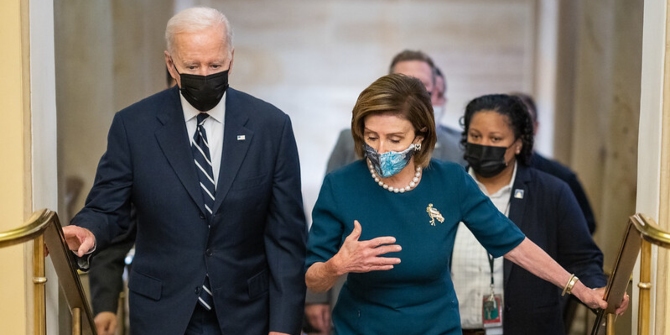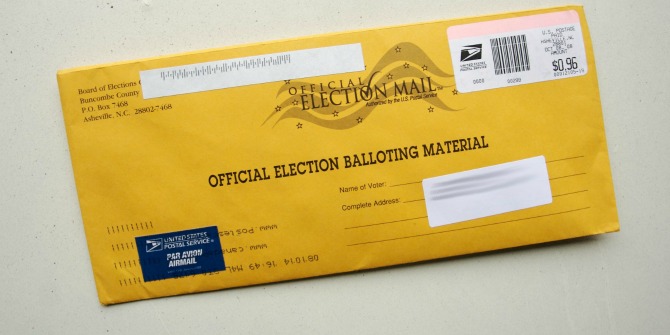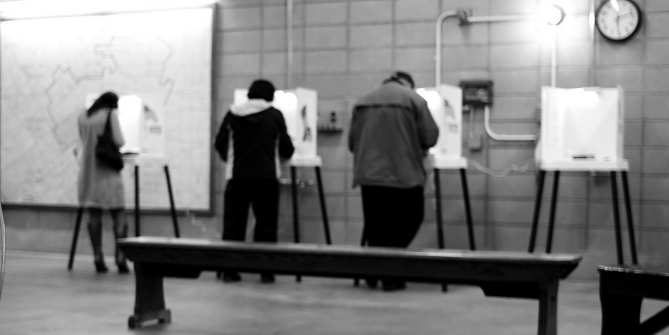 The writer F. Scott Fitzgerald once famously said, “There are no second acts in American lives”, but does this apply to politicians as well? In new research using voting data for ex-governors for the last forty years, George A. Krause finds that, over time, governors’ reputations on the economic performance of their time in office declines, whether it is good or bad. He writes that politicians’ wishing to maximize their odds of having a ‘second electoral act’ should run for office as soon as they leave office if their record of economic performance is a good one, while those with poor prior economic records should take a considerable break when it comes to seeking office again.
The writer F. Scott Fitzgerald once famously said, “There are no second acts in American lives”, but does this apply to politicians as well? In new research using voting data for ex-governors for the last forty years, George A. Krause finds that, over time, governors’ reputations on the economic performance of their time in office declines, whether it is good or bad. He writes that politicians’ wishing to maximize their odds of having a ‘second electoral act’ should run for office as soon as they leave office if their record of economic performance is a good one, while those with poor prior economic records should take a considerable break when it comes to seeking office again.
It is increasingly common in an era of career politicians, both in the United States and elsewhere, for voters to witness either defeated or ‘retired’ politicians return once again to seek elective office. In fact, these politicians return to the electoral arena as non-incumbents seeking either a different office, or one that they previously held. Recent examples of this include California Governor Jerry Brown, who returned to office in 2011 after two terms in the 1970s and 1980s, and former Florida Governor Charlie Crist, who is currently seeking a return to his job in Florida after holding the position from 2007 to 2011.
In new research, my co-author, Benjamin F. Melusky, and I seek to understand the electorate’s ‘stamina’ for holding individual politicians accountable in election contests based on their economic performance in prior elective office. Our work departs from existing research on retrospective economic voting behavior focusing exclusively on holding current incumbent politicians electorally accountable for their economic performance while in office.
We examine whether the passage of time alters voters’ ability to reward and punish politicians by supporting them for subsequent elective offices, based on their prior economic performance. We also look at whether this electoral accountability linkage varies based on the time frame used by voters when assessing how to vote based on this economic performance. Addressing these puzzles is of vital importance for those interested in issues of electoral accountability since our research provides novel insights regarding the extent and nature by which voters can reward competent politicians versus weeding out incompetent ones who seek a ‘second act’ in office. We find that six to eight years after politicians leave office, voters’ assessment of their economic performance, positive or negative, has largely disappeared.
The core logic of our theory on reputation depreciation is most easily summarized by Figure 1. The theory predicts that as time elapses between when politicians leave office and their next (future) election contest, the way that voters value their past economic performance in office falls, even if that performance was effective or ineffective. This theory also predicts that this reputation depreciation process is exacerbated the longer the evaluative time frame used to evaluate prior economic performance.
Figure 1 – Implications of Reputation Depreciation Theory over time
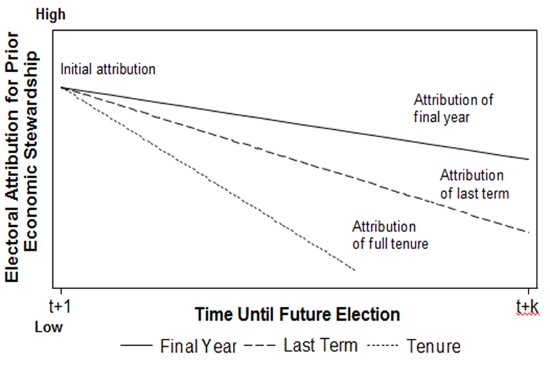
We tested our reputation depreciation on aggregate voting data for all individual ex−governors seeking elective office as U.S. Senator or governor from 1970-2010 in primary and general election contests for either U.S. Senate or gubernatorial posts covering the same political jurisdiction (115 observations). Although the sample size is somewhat modest and entails aggregate-level observational data, we more rigorously test the reputation depreciation theory’s two main predictions. The consistency of the empirical findings given this scrutiny of the data is encouraging when it comes to offering compelling empirical support for reputation depreciation theory.
Figure 2 – Estimated Impact of Reputation Depreciation of Prior Economic Stewardship on Ex−Governors Vote Share in Future Election Contest
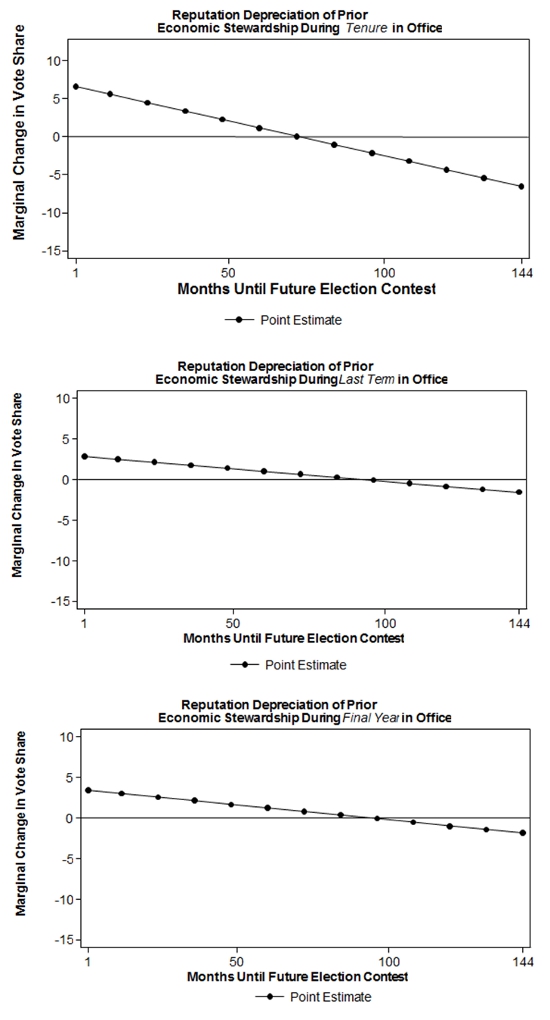
The predictions of reputation depreciation theory are empirically supported by the downward sloping lines in Figure2 that show the estimates of how voters’ hold politicians accountable for economic performance falling over time. Further, this reputation depreciation effect is much steeper when based on the ex-governor’s economic record during their entire tenure in office (1.10 percentage vote share decline for each additional year they wait to re-enter the electoral arena) compared to either retrospective economic evaluations made in either the final term (0.37 percentage vote share decline for each additional year they wait to re-enter the electoral arena) or final year (0.44 percentage vote share decline for each additional year they wait to re-enter the electoral arena).
Figure 3 – Estimated Impact of Reputation Depreciation of Ex−Governor’s Prior Economic Stewardship on Their Expected Vote Share in a Future Election Contest
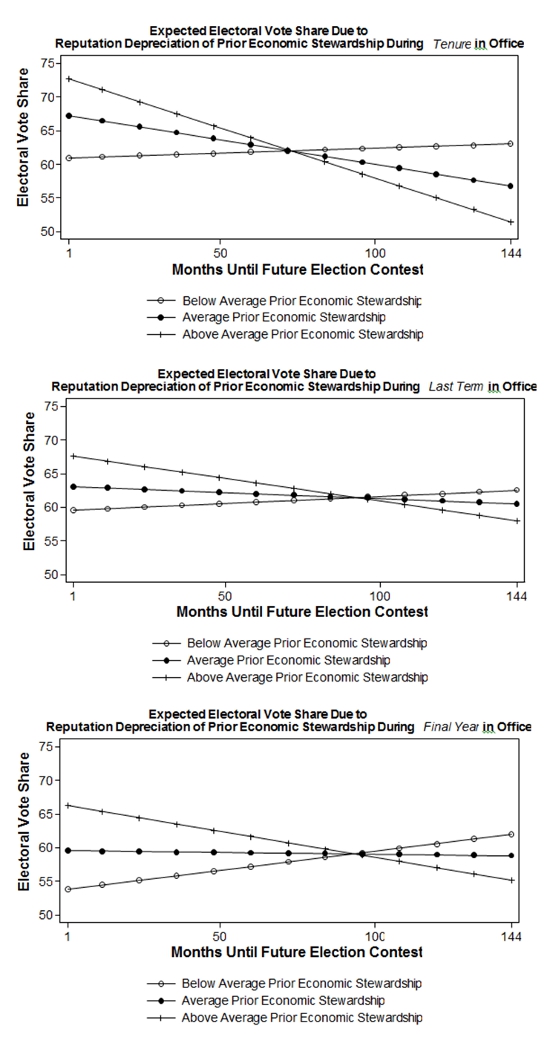
Figure 3 indicates that future electoral support converges for Above Average, Average, and Below Average economic stewardship by ex-governors. This pattern of convergence for performance accountability holds under alternative time frames for making retrospective economic assessments. These varying performance levels obtain roughly the same predicted vote share approximately six years (72 months) after exiting office as governor under a tenure-based retrospective economic evaluation, and eight years (96 months) after leaving the governor’s mansion based on assessing their economic performance in either their final term or final year in office.
Our findings have two broader implications for understanding electoral accountability in democratic settings. First, ex-governors’ reputation, rooted in economic performance, is a rapidly depreciating asset which benefits ineffective ex-governors by increasing their prospects for a ‘second act’ in major statewide elective office, while diminishing those prospects for effective ex-governors whose prior record in office justifies greater electoral support by voters than it actually receives. This counterintuitive pattern of falling electoral gains from effective economic performance reveals that behavioral biases get worse over time in terms of electoral accountability, which is hardly surprising. In turn, the theory and evidence advanced in our research suggests that politicians’ wishing to maximize their odds of having a ‘second electoral act’ should run for office as soon as exiting current office if their prior record of economic performance is strong, while those with poor prior economic records should take a considerable break when it comes to seeking subsequent elective office.
Finally, our evidence suggests that term limits, and other candidate-eligibility restrictions that force incumbent politicians out of office by means other than electoral defeat, may have the unanticipated effect of reducing electoral accountability by unjustly rewarding ineffective politicians, while punishing effective ones. Holding currentincumbent politicians electorally accountable for their performance in office is a much easier task in a democracy than to do so for non-incumbent politicians with a distant prior record of performance. Although political ‘second acts’ often do occur in American politics, our research suggests that they may very well come at the expense of reducing electoral accountability, and hence, diminishing the caliber of democratic performance.
This post is based on George A. Krause and Benjamin F. Melusky’s article “Retrospective Economic Voting and Intertemporal Dynamics of Electoral Accountability in the American States” forthcoming in the Journal of Politics (November 2014). An advanced online publication version of their article can be obtained here.
Featured image: Former Florida Governor, Charlie Crist, Credit: Andres LaBrada Photographer (Flickr, CC-BY-2.0)
Please read our comments policy before commenting.
Note: This article gives the views of the author, and not the position of USApp– American Politics and Policy, nor of the London School of Economics.
Shortened URL for this post: http://bit.ly/1BbpSss
_________________________________
 George A. Krause – University of Pittsburgh
George A. Krause – University of Pittsburgh
George Krause is a Professor in the Department of Political Science at the University of Pittsburgh. His research interests center on American politics, with primary research programs focusing on executive branch politics (public bureaucracy, presidents, and governors), organizational-theoretic approaches to the study of institutional politics, and behavioral decision-making in both elite (institutional) and mass public settings.



